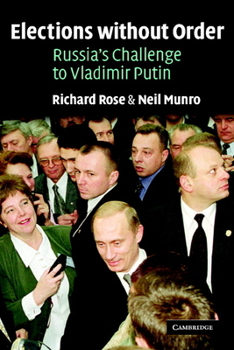Elections Without Order: Russia's Challenge to Vladimir Putin
Select Format
Select Condition 
Book Overview
Russians want both free elections and order, but order - a sense of predictability in everyday life and the rule of law - has been in short supply. This is the challenge that Russia presents to... This description may be from another edition of this product.
Format:Paperback
Language:English
ISBN:0521016444
ISBN13:9780521016445
Release Date:September 2002
Publisher:Cambridge University Press
Length:274 Pages
Weight:0.95 lbs.
Dimensions:0.7" x 6.0" x 9.1"
Customer Reviews
1 rating
A dense analysis of various polling results
Published by Thriftbooks.com User , 17 years ago
The book proposes a number of sophisticated theoretical statements on the sources of the protraction or partial failure of Russia's transition so far. One of its basic claims is that Russia has entered the road of democratization without yet being a fully "modern" state. This implies that it does not yet have a rule of law, an effective civil society, and mechanisms to hold politicians accountable between elections and even through them. The positive effect of the introduction of electoral procedures - though being by themselves more or less meaningful - is thus diminished by the context in which the candidates and voters interact. That is what is meant by "Russia's challenge to Vladimir Putin." Such a proposition constitutes an adequate and lucid diagnosis though I doubt that the term "modern" is the most appropriate one to conceptualize the issue at hand here. ("Modernity" is, in general, such a diffuse concept that it might be better to avoid it in focused social analysis.) Still, the substance of Rose's and Munro's argument is certainly relevant. One would wish Putin, his assistants and Russian politicians in general would read the book because it so refreshingly clearly states what Russia's major problem today seems to be. This is one of the general advantages of this text. The authors' opinions are stated explicitly, and their critique of Russian practices sometimes borders to what Russians might consider "politically incorrect." For instance, the authors affirmatively quote S.E. Finer who judged Ivan the Terrible's rule to have been "the most extreme example of arbitrary and capricious despotism to be found anywhere" (as quoted on p. 17). When Rose and Munro deal with the pathologies of the post-Soviet Russian political structure by way of not lamenting the absence of a real party system, as is often done, but introducing the idea that there are four party systems producing "a system of floating parties" they can be envied for finding original ways to decipher one of the major paradoxes of post-Soviet Russian politics. I found reading Rose's and Munro's thus to be fun and a challenge at the same time. We learn a lot about Russia. The opinions of the authors on many issues in her politics and society are well-informed. But the range of issues dealt with is too broad, and the amount of numbers and percentages sometimes overwhelming (at least, for those among us not trained in memorizing and computing large amounts of numerical data). A narrower focus of the study, presentation of less survey results, and use of more qualitative data might have made the argument clearer.




